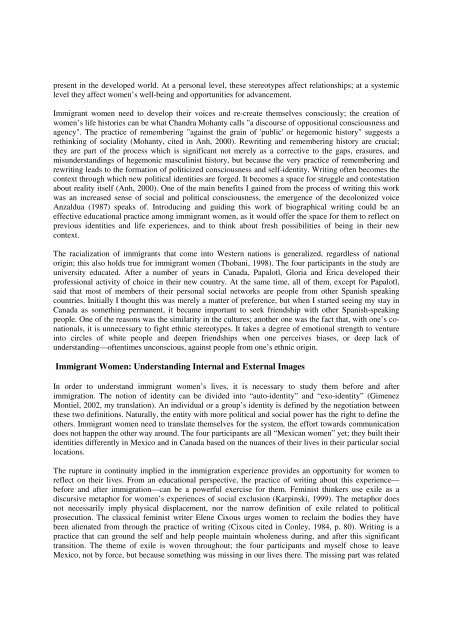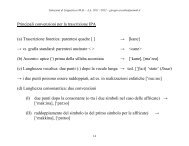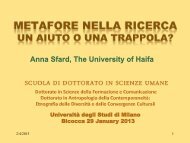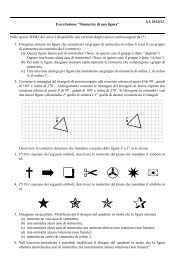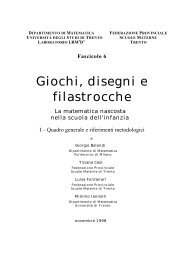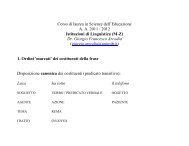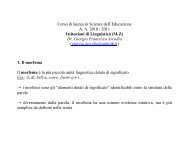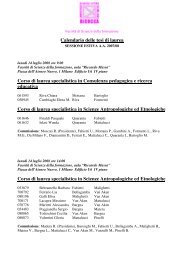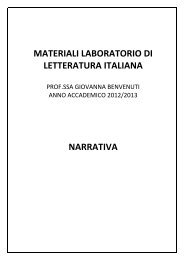Life history research: A contribution to processes of adult learning ...
Life history research: A contribution to processes of adult learning ...
Life history research: A contribution to processes of adult learning ...
Create successful ePaper yourself
Turn your PDF publications into a flip-book with our unique Google optimized e-Paper software.
present in the developed world. At a personal level, these stereotypes affect relationships; at a systemic<br />
level they affect women’s well-being and opportunities for advancement.<br />
Immigrant women need <strong>to</strong> develop their voices and re-create themselves consciously; the creation <strong>of</strong><br />
women’s life his<strong>to</strong>ries can be what Chandra Mohanty calls "a discourse <strong>of</strong> oppositional consciousness and<br />
agency". The practice <strong>of</strong> remembering "against the grain <strong>of</strong> 'public' or hegemonic <strong>his<strong>to</strong>ry</strong>" suggests a<br />
rethinking <strong>of</strong> sociality (Mohanty, cited in Anh, 2000). Rewriting and remembering <strong>his<strong>to</strong>ry</strong> are crucial;<br />
they are part <strong>of</strong> the process which is significant not merely as a corrective <strong>to</strong> the gaps, erasures, and<br />
misunderstandings <strong>of</strong> hegemonic masculinist <strong>his<strong>to</strong>ry</strong>, but because the very practice <strong>of</strong> remembering and<br />
rewriting leads <strong>to</strong> the formation <strong>of</strong> politicized consciousness and self-identity. Writing <strong>of</strong>ten becomes the<br />
context through which new political identities are forged. It becomes a space for struggle and contestation<br />
about reality itself (Anh, 2000). One <strong>of</strong> the main benefits I gained from the process <strong>of</strong> writing this work<br />
was an increased sense <strong>of</strong> social and political consciousness, the emergence <strong>of</strong> the decolonized voice<br />
Anzaldua (1987) speaks <strong>of</strong>. Introducing and guiding this work <strong>of</strong> biographical writing could be an<br />
effective educational practice among immigrant women, as it would <strong>of</strong>fer the space for them <strong>to</strong> reflect on<br />
previous identities and life experiences, and <strong>to</strong> think about fresh possibilities <strong>of</strong> being in their new<br />
context.<br />
The racialization <strong>of</strong> immigrants that come in<strong>to</strong> Western nations is generalized, regardless <strong>of</strong> national<br />
origin; this also holds true for immigrant women (Thobani, 1998). The four participants in the study are<br />
university educated. After a number <strong>of</strong> years in Canada, Papalotl, Gloria and Erica developed their<br />
pr<strong>of</strong>essional activity <strong>of</strong> choice in their new country. At the same time, all <strong>of</strong> them, except for Papalotl,<br />
said that most <strong>of</strong> members <strong>of</strong> their personal social networks are people from other Spanish speaking<br />
countries. Initially I thought this was merely a matter <strong>of</strong> preference, but when I started seeing my stay in<br />
Canada as something permanent, it became important <strong>to</strong> seek friendship with other Spanish-speaking<br />
people. One <strong>of</strong> the reasons was the similarity in the cultures; another one was the fact that, with one’s conationals,<br />
it is unnecessary <strong>to</strong> fight ethnic stereotypes. It takes a degree <strong>of</strong> emotional strength <strong>to</strong> venture<br />
in<strong>to</strong> circles <strong>of</strong> white people and deepen friendships when one perceives biases, or deep lack <strong>of</strong><br />
understanding—<strong>of</strong>tentimes unconscious, against people from one’s ethnic origin.<br />
Immigrant Women: Understanding Internal and External Images<br />
In order <strong>to</strong> understand immigrant women’s lives, it is necessary <strong>to</strong> study them before and after<br />
immigration. The notion <strong>of</strong> identity can be divided in<strong>to</strong> “au<strong>to</strong>-identity” and “exo-identity” (Gimenez<br />
Montiel, 2002, my translation). An individual or a group’s identity is defined by the negotiation between<br />
these two definitions. Naturally, the entity with more political and social power has the right <strong>to</strong> define the<br />
others. Immigrant women need <strong>to</strong> translate themselves for the system, the effort <strong>to</strong>wards communication<br />
does not happen the other way around. The four participants are all “Mexican women” yet; they built their<br />
identities differently in Mexico and in Canada based on the nuances <strong>of</strong> their lives in their particular social<br />
locations.<br />
The rupture in continuity implied in the immigration experience provides an opportunity for women <strong>to</strong><br />
reflect on their lives. From an educational perspective, the practice <strong>of</strong> writing about this experience—<br />
before and after immigration—can be a powerful exercise for them. Feminist thinkers use exile as a<br />
discursive metaphor for women’s experiences <strong>of</strong> social exclusion (Karpinski, 1999). The metaphor does<br />
not necessarily imply physical displacement, nor the narrow definition <strong>of</strong> exile related <strong>to</strong> political<br />
prosecution. The classical feminist writer Elene Cixous urges women <strong>to</strong> reclaim the bodies they have<br />
been alienated from through the practice <strong>of</strong> writing (Cixous cited in Conley, 1984, p. 80). Writing is a<br />
practice that can ground the self and help people maintain wholeness during, and after this significant<br />
transition. The theme <strong>of</strong> exile is woven throughout; the four participants and myself chose <strong>to</strong> leave<br />
Mexico, not by force, but because something was missing in our lives there. The missing part was related


